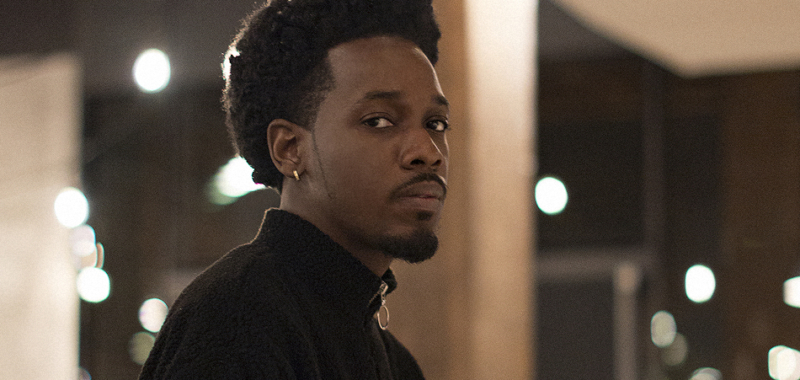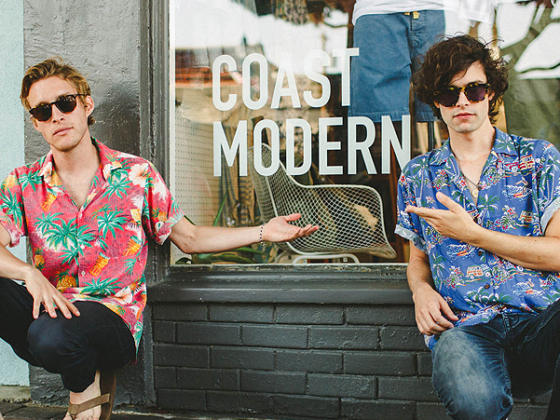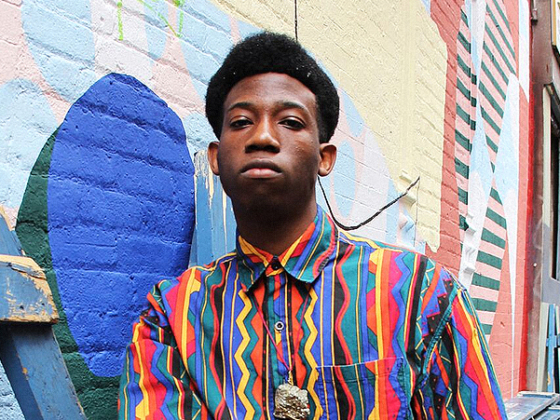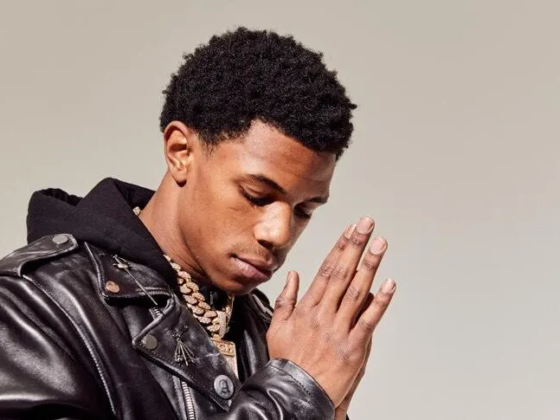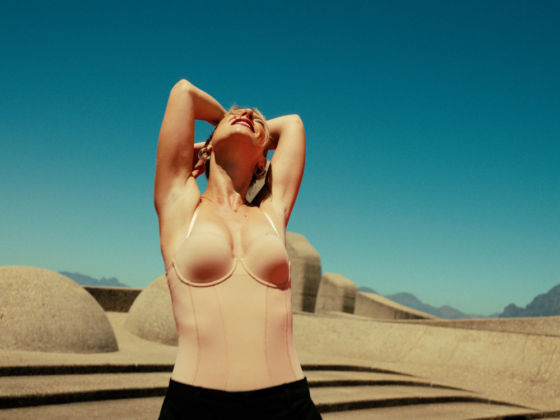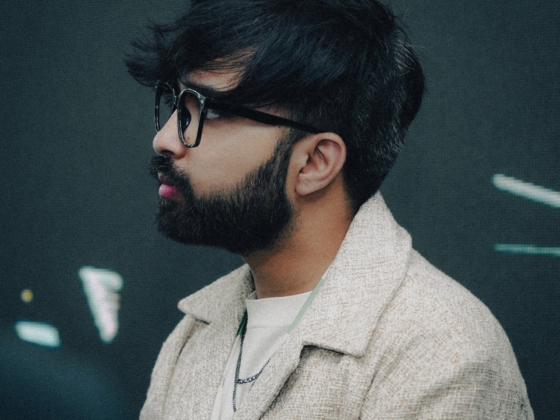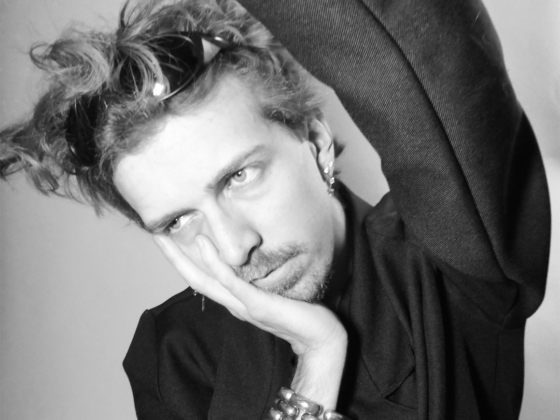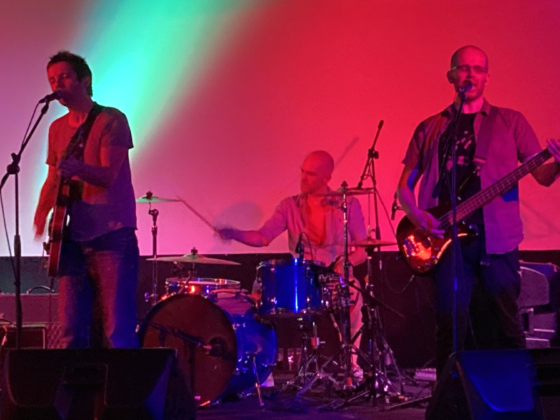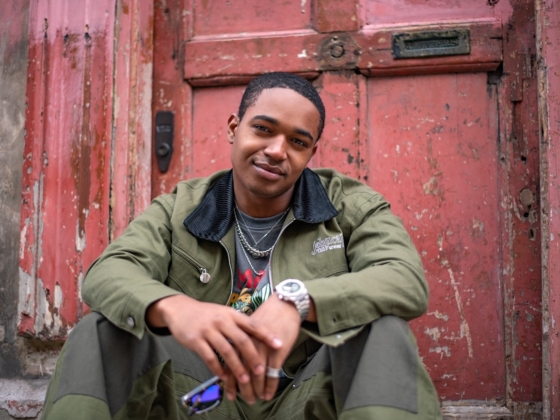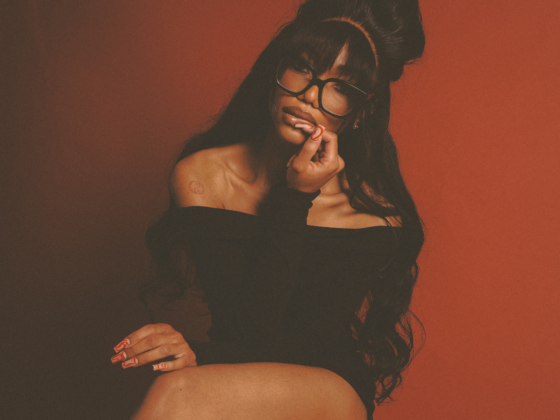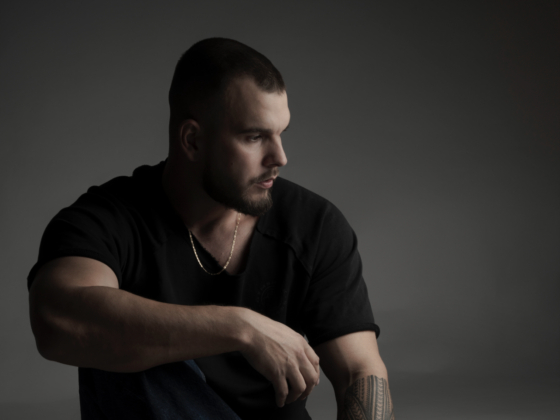I get sent more music than I know what to do with most days of the week. A couple months ago, I was sent a single by Adrian Daniel and was immediately taken aback (in the best way possible) by how I felt listening to it. The song was "Deadly Attraction," and even over the course of three minutes it was easy to hear that he was doing something different: despite being a recently recorded song with modern sounds and structure, there was a timeless warmth throughout that made it come to life with every listen.
Flawd is the latest entry in Daniel's catalogue and serves as a perfect introduction into the sonic world he's been building over the last decade. His voice soars over each track and highlights the artistry going into every bar and measure. The music is ambitious, thought provoking, and transports you somewhere else entirely while listening: from his lyrics, to the production, to the track listing, everything is deliberate and feels like it belongs. Frankly, I could wax poetic about this album for another paragraph or three, but I'm going to just say this: Flawd is a thrill ride of an album and you're doing yourself a disservice if you haven't already started listening to it.
I had the opportunity to speak with Adrian last month in his hometown of Brooklyn, New York where we covered everything from his beginnings in music to what he reads and even how he writes a song. Find the transcript of our conversation below.
EM: I was listening to your album right before coming here and really like it; I love the production on it, like how it flows all the way through. My favorite thing is that every song makes you want to shoulder dance. What led to you developing that?
Adrian: I just like music that has a groove. Even if it has slow or mid tempo… My thing is that music is supposed to make you feel something all the time. Whether or not if you’re standing still or moving around. I like to make music when I’m walking or driving. I’m always walking everywhere. I want to make music that gets me through that. I was a dancer before; straight dancing and teaching hip-hop.
EM: What got you into that?
Adrian: My mom put me in classes to help me stay out of trouble. So I was young. I was growing up in Brooklyn. I grew up in East Flastbush/ Brownsville. It wasn’t the nicest place to grow up. It was easy to get caught up around what was going on around there. My mom saw that I had so much energy she wanted to put me in dance class. I hated it but I ended up really loving it and really for a while that was job. I was literally paying rent and bills off of dancing.
EM: What came first? Singing or dancing?
Adrian: I was always singing. My Godfather was Lionel Hampton… He would have us come over learn the vibraphone because that’s what he was really good at. I was always singing. He told my mom before I was born that I’m going to be a musician. She was like, "No."
EM: How did he predict that?
Adrian: I don’t know. He just looked at her and said "He’s going to be a musician." And she was like “No, he’s not, he’s going to be a doctor.” Whenever I’d go to his house he’d always make me practice. I thought we were going to play games and he’d be like “No, we’re going to practice.”
EM: Do you have an album that you grew up with that was the album that clicked that thing in your brain and let you listen more critically and decide yes I could do that?
Adrian: That might have to be Stevie- Songs in the Key of Life. That was the first album where it was a whole ‘nother world. When I was growing up, 50 Cent’s Get Rich or Die Trying– that was everything to us. You know, I’m from Brooklyn, I love HOV and Big, but at that time, like 2001, 2003, that was everything, you know what I’m saying? I was heavy on that. We knew all the words.
EM: That was the biggest album at the time, right? I didn’t live in the country at that time, so I’m a little absent of that time, but especially in New York that was the album, right?
Adrian: It was the biggest album. Jay-Z had retired at the time. It was just on some street stuff- being bad. It made us feel good about being bad. There was so much pain in it. We related to a lot of the things he was talking about. I didn’t start analyzing music until I heard Songs in the Key of Life.
EM: Did that sort of push you down into a direction of more stuff like Stevie?
Adrian: Nah. Because I always loved Michael. I always tried to be like him.
EM: How did you try to be like Michael?
Adrian: I used to do the dances. That’s how I learned to dance. My mom watched me in front of the TV trying to mimic his moves when I was like five. She said “I’m going to put you in dance class” and that’s literally how that happened. I used to try to sing all his songs. I could sing high. I would sing everything; It would be like Michael, Frankie Lymon… anybody who could sing really high, I would try to mimic their voices.
EM: How did you learn how to sing high? What was the processes of learning that? Were you always naturally able to do that?
Adrian: Yeah. I’ve always been able to do that, but I had to learn how to control it. I had no idea. It just goes back to me being how I am and always wanting to be better at what I do. Once I decided that I was going to really sing, I went right into vocal lessons to learn how to use my instrument because I had no idea what I was doing; I was just yelling and screaming. But I could always do that shift from super super high to super low. But how do I use this? I didn’t know how to use it properly. It took me time to figure it out enough to where I did it naturally and didn’t have to think about it.
EM: What was the moment that you were like "I can actually do stuff with music enough to make this work"?
Adrian: What was that moment? I’m still shocked sometimes. I’m still in that moment. It’s surreal for me. I’m just talking, I’m just expressing myself. All these ideas in my head and I’m just trying to get them out. I think it was 2am. I had just come back from making a song and I had played it for my mom. My mom is always hard to please. She had me listen to Queen, Journey, Prince, Michael, all that… It was hard to please her musically… She always tells me this story of when she was a kid and she got to go on stage with Jackie Wilson and James Brown. In the 70's she was hugely into Led Zeppelin and Muddy Waters and all these guys. She would collect the records. I went down into the basement this one time I just happened to see a crate of records. And I asked “What is all this?” and she said “This is stuff I bought.” She always listened to anything. But really hard to please. Because she grew up on that, anything that was current or now she wasn’t into it. So when she dug my music that’s when I realize I could do this.
EM: Is there a certain mom filter? If she says ‘I don’t know’ does it make you question the song a little bit?
Adrian: All the time. Sometimes I say “You don’t know what you’re talking about” because I realize she’s older. She doesn’t know this. But there are times when it comes to quality and feeling, you know what I’m saying?. She’s looking for a feeling. When she tells me it’s there, but it’s not completely there. Then I tell her, okay, well let me know when it’s there.
EM: Knowing that your Mom grew up with such a diverse taste of music makes a lot of the songs on your album make more sense. I’m forgetting the name right now. But maybe between the 4 and 7th track… there’s a lot of guitar parts on it.
Adrian: "Face of Eve," most likely.
EM: Yeah. It’s a really musical song and really musical album. I was reading code at work and that was on and just realized how zoned out I was while listening. It makes a lot more sense now knowing that was around you while growing up.
Adrian: Catwell produced that, he’s also featured on it. The way we look at music is like that. It’s like a code. I remember when I had, the way I work with music is I record everything like I’ll write all the melody and all the lyrics and record my background and send it to him. I sent that to him and put everything together. He went crazy, he went HAM. He was like “This is hot. It makes me feel”. That’s always what we’re trying to do. To make you zone out. You know what I hate? I hate music when you’re playing it and you don’t even know it’s on. I don’t like music like that. I like music when the moment comes out you’re going to make that face like “what’s that?”.
EM: Do you ever listen to country music?
Adrian: Absolutely.
EM: Who do you like for country music?
Adrian: Rascal Flatts is one of my favorites… There would be times when you’re listening to certain things and it has country-ness to it. When John Mayer went sorta country. I enjoyed all those projects. I’m a huge John Mayer fan. All of those things – blending of sounds and different genres. To me -you couldn’t really tell what it was from just listening to it … either it was rock, soul or country blues. There was always this doubleness to the music I was growing up with. So I try to mimic that.
EM: It’s ultimately all just music. It’s just a well written song if you’re doing it right. When did you figure out how to make a song that could transport someone? The people you teamed up with who produced your album – they really got you and the flow of your song writing. Everything comes together in a way where I don’t want to listen to your album one song at a time, I want to listen to the whole thing.
Adrian: That’s what I want. Most people will be like we’ll send you beats. But I hate doing it that way. I have to be there making it from scratch with them. That requires time and building with people. When I select people to work with I like people who are inspiring to me. And what they’re doing I”ve never done that before so let’s do something. They’re pushing me in a way that I’ve never been pushed before and I’m pushing them in a way that they haven’t been pushed before. I just want to make exciting music. That’s all I want to make. That’s what I listen to. To this day – it takes me somewhere. My Beautiful Dark Twisted Fantasy is one of my favorite albums of all time and everytime I put that on I’m literally transported to 2010. Kanye’s got a crown on with a red suit and that’s what I feel like. That’s what I want to do every time I make a record. It’s a moment that makes you feel like this moment no matter where you go.
EM: That’s a great album for that. I feel like there’s a point in the last 10 or 15 years that it was one of the first album when a lot of rap artists and R&B artists started making indie albums. In the sense of “No, we have to make a fat concept album. I want people to sit in this.” That album is a great album where every time I put it on I know where I was when I first heard it. I bet you could say what you were doing and where you were when you first hit play. How did you first hit play on that album?
Adrian: I wanted to have the CD because he had the really cool casings. I like to collect those things and different art. I got the cd and the vinyl. The vinyl came with extra stuff that I hung on my wall. I had all different colors for it. I had to get both; this was important.. Then I had the cd and put the cd into my computer to play it through iTunes. I just turned it up really loud and closed my door and remember this because I remember I just got yelled at for ten minutes. Like “Don’t play that shit, it’s too loud.” (laughs) I had to. From the moment it came on I knew it was about to be incredible. Strapped in. Every song I loved. When I listen to music that’s what I’m trying to do.
EM: How do you get through when you’re hitting roadblocks? How do you challenge yourself to move around the blocks or do you say "fuck the blocks" and go through them?
Adrian: Sometimes I don’t think about it. There are times I’m over thinking something. “I’m overthinking this. Let me just go back.” There are times you hear songs and they’ve been rewritten two or three times. Because I’m over thinking them or I’m doing too much or am I saying what I want to say? I’ll just test that out. I’ll go to people and different types of things. People who listen Meek Mill and that type of music. And then people who listen to only old school music. And I'll ask them questions: "Do you know what I’m saying? Do you know what I’m trying to do?" If they both say yes, then I know I did something right. If one says no and the other says yes then I gotta find that medium. That’s what I want to make at the end of the day. I don’t want to make music that appeals to just one person, I want to appeal to everybody. Because everybody has been through the things I’m talking about. It’s just about how to make it relatable.
EM: I was talking to another artist a couple weeks ago and he mentioned something about how when he’s making music he puts into account that every person who is going to hear what he makes will hear it in a different way, or be introduced to him in a different way. Are you conscious of that? Do you carry that with you?
Adrian: Yes, that’s why I try to make every song important. You know people go into records and they just care about the one song and put some throw away songs that they don’t care about. And I’m like no because someone might hear just the ending of this song and be like “what is that?” and go back and play everything that he’s ever done. It’s important that those things are still as good as what I’m doing right now. Or even better. I challenge myself to make every record better than the last one. Because it’s about growth and pushing myself. And pushing the creativity of this music stuff and inspiring people.I’m totally conscious of even the ending: It has to capture your attention. It has to make you feel like “I’ve never heard that, let’s run that back. What song is that? Shazam, whatever you want to do.” And I’m very conscious of that… whether it’s on a phone speaker or speakers in this place. It has to make you feel like “What’s that?”.
EM: Do you think that playlists and that way of getting music has kind of detracted from that feeling?
Adrian: Yeah. Because before you had to listen to a whole album. You couldn’t just pick the song you wanted to listen to, let me just go straight to the feature. You had to listen to the whole thing. You wanted to. Right now we’re so about features that you’ll just go straight to it. And sometimes the feature isn’t that good. It’s not even the best song on the record. Frank, who is one of my favorite artists, said "the best song isn’t the single." Most of the time it’s not. When I think about it most of the time the single is not the best song on the record. And if it is, you should probably go back and redo your record. I feel like it messes up the way people deal and go about it. It’s about sticking to what you want to do. There are people who still care about that thing. They still care about albums and vinyl. Vinyl had a year last year. There’s people who care about that, holding something in their hands. This is about how you appeal to them in 2018. How do you get people to sit with you in 2018? It’s how you package it and how you market it. All those things are important to really make people say “Okay this is something I have to sit down and really watch." Really listen to compared to walking in and out of it and still getting the gist of it. It’s two different things.
EM: What album do you always go back to if you’re in a place where you don’t know what to do next with your music? Like if you need some kind of refresher on your brain?
Adrian: That’s a good question. I’ve definitely played Bad. It’s one of my favorite albums ever. People always say that’s not his best album. That Thriller is the best album but I don’t know. Bad just seemed to be him trying things. It just sounds ridiculous.
EM: What song really gets you going on Bad?
Adrian: “Dirty Diana”, just out the gate. From the moment it came on, and he said “You never make me see, you take my weight over me” the moment he did that, that’s it. I’m sold. Take my money. It’s like, you felt everything he was saying. I just want to always do that everytime. Whether I’m being soft or I’m being hard. I want you to feel what I'm saying. Yeah, I go back to Bad.
EM: What do you do for fun outside of music?
Adrian: I’m a huge anime comic person.
EM: What are you reading?
Adrian: Right now I just got a gift of the full Akira box set. I’ve been digging into it. OD. I even have the how they came up with the image concepts, so I’m just really studying that whole thing. I’ve been reading it for the past two weeks. I’m into that right now. I watch all the anime shows. I’m super into One Punch Man right now. It’s so hilarious to me. I’m into architecture. I spend most of my time now when I’m not working on music or watching anime or comic stuff I’m learning how to design and how to do interior design. I’m really into that. I just want to know how buildings are built.
EM: What got you into that?
Adrian: I used to walk around places. I just would think “I like the way this looks", "how did they do this?” I know there’s a plan. They had a plan to put it together. I read Pharrell’s Places and Spaces…. Even when you don’t think about it, design and fashion and clothes all influence music. Or all comes from music in a way. They’re probably making things while they’re listening to a song, probably Bob Dylan or some Tame Impala song. You can really tell and say that has a Tame Impala vibe to it. Or you can look at something that looks like “Get Rich or Die Trying". You just look at it and you know. That’s what I’m into. And photography. I’m trying to master iPhone photography. I’m trying to force photographers – "How do I get good lighting here, show me how to do this." They don’t want to tell me. "I can’t give you my secrets!" Come on man.
EM: Now that you’re reading more about things you're into and having more time to play with things, are you trying to work that into your music?
Adrian: Yeah. With this album, Flawd, a lot of it is inspired by Akira. Which is cool that I got that box set.
EM: How was it inspired by Akira?
Adrian: When I was watching the movie, I just thought “What would a soundtrack to this sound like?” And I just did my best interpretation of it.
EM: Have you played your album while Akira is playing?
Adrian: Yeah.
EM: So it’ll play? Awesome.
Adrian: It’s not long enough though. Because that movie is like really long. There’s certain scenes where you’ll play a song and you’ll know. Right out the gate is that intro scene. It’s just nuts. “Wouldn’t it be crazy if this super horrific scene had some calming music to it?” That’s just me being in my head.
EM: Well, you’ve given me something to do for the rest of the night… When you’re writing lyrics do you write on piano, on guitar or just write?
Adrian: I just write. Mostly I write while I’m walking. It’s so important to me to be moving when I’m thinking about things. When I’m listening to music, most of the time I’m walking or going somewhere. So when I write my songs I’ll be like “This is the lyric I’m looking for.” It’ll be randomly. I wrote "Roxanne" on the train at 4am, you know what I'm saying? It’s literally how it happened for me. It’s not a method. My songs just write themselves. It’s my life. I pull from moments in my life. Or something someone is talking about that I can relate to I’m like, “That’s a song.” That’s how I write. It’s very all over the place. It’s very purposeful.
EM: Knowing that you are really into architecture from your photography and all of these things together, what is a spot in New York from like an architecture perspective that you can go to, and just look at that and just vibe that?
Adrian: Uh
EM: Not to like, blow up your spot or anything.
Adrian: There’s a couple places actually. I love going to the Botanical Gardens. The plaza area, I just love going there. There’s this circle and it reminds me of Paris. Everything is happening. I just look at the building. It sounds like very prestigious music. You know what I'm saying? Then I’ll go to this place that’s in Brownsville called The Plaza. It’s a castle. It’s like a legit a castle, but it’s probably the most dangerous place you can go to.
EM: Is it like, closed down and condemned?
Adrian: No, It’s an apartment building but like, with a lot of gang members. I wouldn’t recommend going there at night time by yourself. I’ll go there and just look at it. Because this is raw, it’s like medieval times, survival of the fittest kind of stuff. Then you’ll go to Dumbo by the water. I love going to the Promenade over there near Jay Street. I like to be in Brooklyn a lot. I go to the city when I have to go. I’d rather be here. I’m a Brooklyn kid. The city feels a bit overrated a lot of times.
Flawd is available now on Apple Music and Spotify. Adrian Daniel is currently on tour, find his dates here.
Photo Credit: Sarah Heaton
Conversation edited for clarity and content.
Connect with Adrian Daniel: Facebook | Twitter | Instagram | Website

